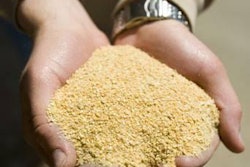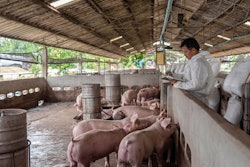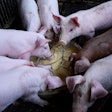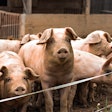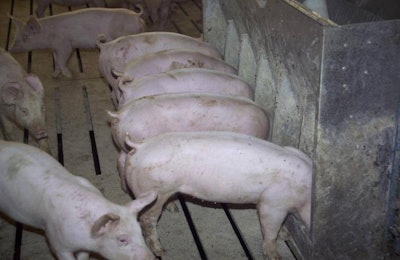
Just five new outbreaks of African swine fever have been confirmed in Asian countries during the past week.
Over the past week, new outbreaks of African swine fever (ASF) have been reported in just two countries in Asia.
China’s agriculture ministry has reported two new outbreaks of the disease on farms to the World Organisation for Animal Health (OIE).
One of these reports outlined an outbreak in the Dingxi region of the central Chinese province of Gansu in September. Of the 287 animals on the farm, 265 died. The most recent cases to be officially reported in the province were in January of this year, and they occurred in different regions of the province.
This month, ASF was also confirmed at a farm in the southern province of Yunnan, according to the official report from the agriculture ministry to the OIE. The virus was detected after 97 pigs died of the 261 animals at the farm in Tengchong city. The rest of the herd has been destroyed. Previous cases in Yunnan were in other regions during August and October.
More recently, one further ASF outbreak in China has been reported by the agriculture ministry. On November 10, a group of 25 pigs was found being transported illegally in the Dianjiang district of Chongqing city in southwestern China. One of the animals died, and the rest were found to be infected with ASF.
Outbreaks in Russian Far East reach 43
Two new ASF outbreaks in the Far Eastern federal district bring the region’s total since the end of July to 43. Both of the latest outbreaks were confirmed this month in the Pozharsky district of Primorsky krai. The district borders China. Experts say disease control is particularly challenging in such remote areas.
One of the outbreaks was in a small backyard pig herd, and the other was in two wild boar found dead in a forest, according to the official report from the agriculture ministry in Moscow to the OIE.
South Korea: government to inspect pig burial sites
A river near the border between South Korea and its northern neighbor has been polluted as the result of official measures to control ASF, reports Yonhap. Due to poor handling and adverse weather, blood from some of the 47,000 culled pigs has leached into a tributary of the Imjin river.
While officials took emergency measures to rectify the situation, the national government set up a team to inspect more than 100 burial sites.
In South Korea, the number of confirmed ASF outbreaks on farms remains at 14. More than 20 wild boar have tested positive for the virus, and more than 300,000 pigs have been culled.
ASF blamed for slump in Asian food company profits
South Korea-based food company CJ Cheiljedang Corp. has blamed a fall of 86% in net profit for the third quarter year-on-year on ASF. Although sales and net profit were up, according to Yonhap, the firm’s costs were increased by the slaughter of pigs in Vietnam and Indonesia.
In contrast, the ASF situation in China has increased margins for a soybean processor. Reduced demand from China has been more than compensated by increased pig production in countries exporting pork to China, according to an ADM executive.
Philippines: pork shortage warning
No new ASF outbreaks have been confirmed in recent weeks by officials in the Philippines.
In order to halt the spread of the disease to new areas, authorities in ASF-free regions have temporarily banned the import of pigs and pork products from infected areas.
Consumers have been warned about possible shortages of processed pork for the holiday season in Ilocos Sur, reports Philippine Information Agency (PIA). Because of a shortage of supplies, one fast-food outlet has removed all pork meals from its menu.
President Rodrigo Duterte is allowing the agriculture department to use some of the presidential contingency fund to tackle ASF, reports ABS-CBN. Aid will be offered to pig producers, and to set up cold storage areas at ports so pork imports can be fully monitored.
ASF is costing the local industry PHP1 billion (US$19.8 million) each month, according to the report. Some 7,000 of the country’s pig have been killed to prevent the spread of the disease.
Asian ASF situation outlook
According to the latest overview of the ASF situation in Asia, OIE puts the number of states in Asia with one or more ASF outbreaks at 11. Official agencies in Indonesia have still to confirm the detection of the ASF virus that has been reported by local media.
Up to November 7, there have been a total of 6,647 ASF outbreaks in Asia since 2018, based on the OIE report. Direct losses of pigs — those that died or have been destroyed at infected premises — now exceed 4.04 million, with almost 3.8 million of these in Vietnam.
The carcass of a dead pig washed up on a beach in Taiwan has tested positive for the ASF virus, according to animal health bureau, BAPHIQ. The virus matched that found recently in mainland China. The finding represents the 12th such infected pig that has been found in Taiwan so far this year.
View our continuing coverage of the African swine fever outbreak.


